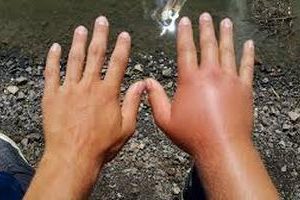Every single cell requires energy in order for your body to function efficiently. The primary source of that energy comes from glucose, also known as blood sugar. Glucose is essential for digestive, heart, and brain function, keeping your vision and skin healthy. Throughout the day, your blood sugar levels will fluctuate. However, when they fall below 70 mg/dL, you have low blood sugar levels, also known as hypoglycemia. There are certain indicators that you have low blood sugar to be aware of. This article will look at 12 signs of low blood sugar.
Have you ever started to sweat and feel clammy, but it wasn’t particularly hot? Feeling sweaty before lunch could potentially signal a blood sugar drop rather than result from the weather. The University of Michigan Health states that hypoglycemia can cause sweating, which is typically more prevalent in individuals with diabetes. However, can happen to anyone as adrenaline surges when glucose dips. Hypoglycemia often causes people with diabetes to experience night sweats.
Your blood sugar is your cell’s main energy source, particularly the brain. When you have low blood sugar levels, your cells can’t function properly as they aren’t receiving any energy. When this occurs, you begin to feel hungry. It’s important to consume foods such as non-starchy vegetables, whole grains, and healthy fats to help stabilize your blood sugar levels. According to Medical News Today, While starchy carbs and sugary drinks may provide a quick surge in blood sugar levels, this effect is not long-lasting and doesn’t help stabilize your blood sugar.
We’ve all been there before: you are waiting for a late dinner companion, feeling increasingly irritated as hunger begins to set in. According to gastroenterologists, there’s science behind that “hangry” feeling. When your blood sugar level dips, stress hormones like cortisol and adrenaline surge. This can often trigger the feeling of irritability. However, we should note that hunger doesn’t always mean low blood sugar – it’s also possible to feel a bit cranky with stable glucose levels.
Hypoglycemia can cause a range of nightly issues besides night sweats. These include restless sleeping and even nightmares. In fact, people with diabetes often report having nightmares that are so bad that they make people wake up from their sleep. Many nocturnal issues are often misdiagnosed, so it’s important to take notice if you are constantly having nightmares. You should speak to your doctor about your pre-bedtime exercise schedule and diet if you have nocturnal hypoglycemia.






